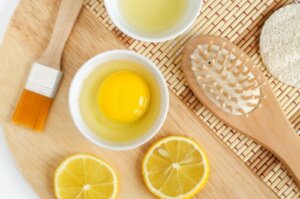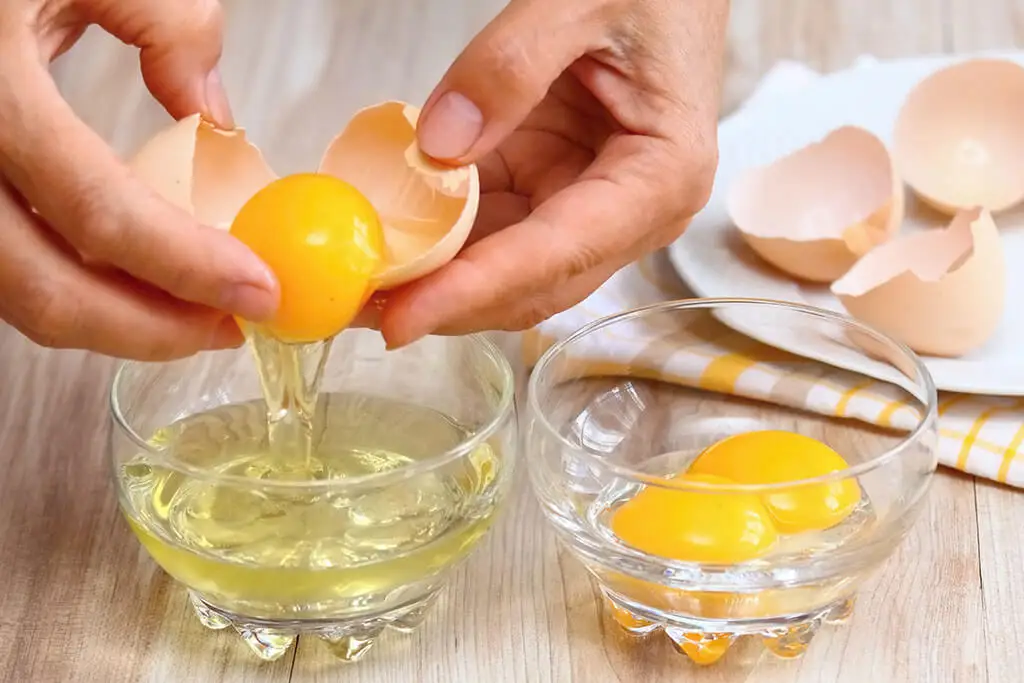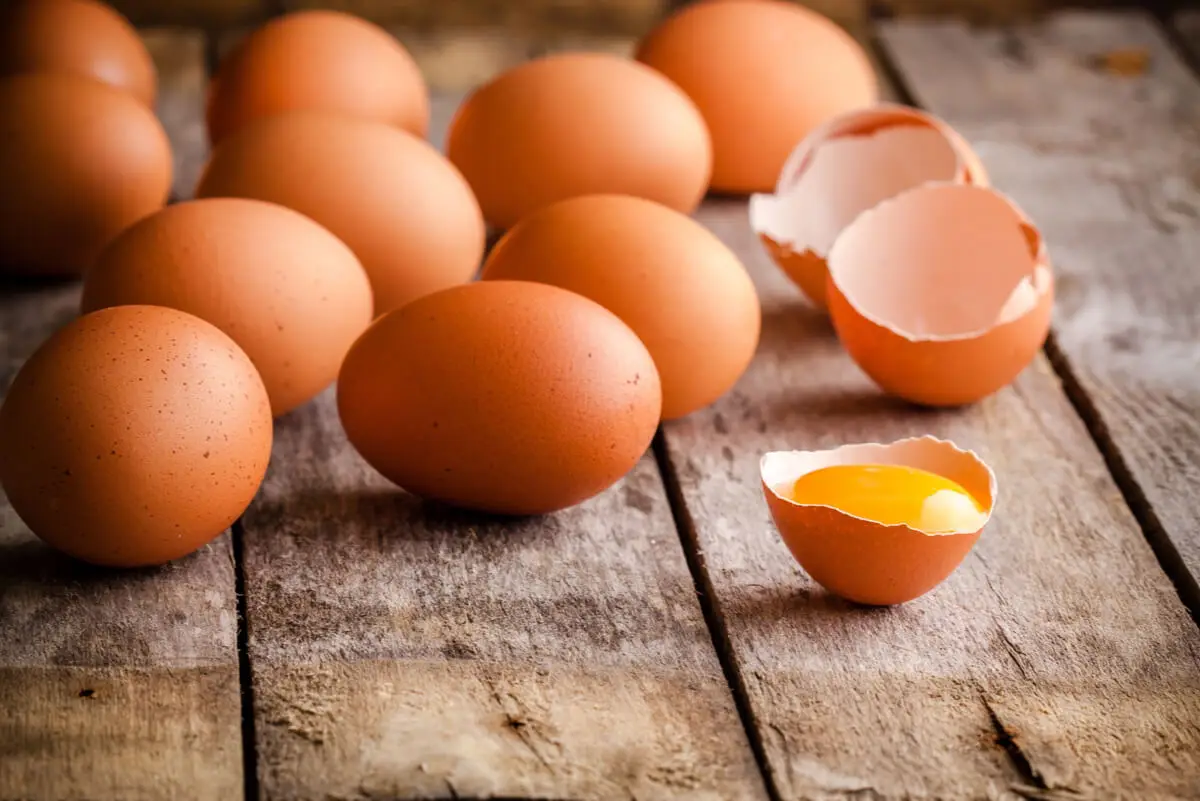What Are the Risks of Egg Masks?


Reviewed and approved by the doctor Leonardo Biolatto
In the world of facial care methods, there are hundreds of options for improving the appearance of the face. This may include tightening wrinkles, lightening blemishes, providing collagen, or even just refreshing your look. While commercial cosmetics are expanding their catalog, homemade treatments, such as egg masks, are gaining more and more followers every day.
The use of egg whites as an anti-aging ingredient generates some controversy. Many people have spoken of the benefits of eggs for the skin for a very long time. However, a small number of possible adverse effects, in specific scenarios, merit paying more attention to this remedy than to other natural serums.
Facials prepared with this food aren’t bad for you. However, it’s a good idea to learn both the benefits and the potential dangers they represent for certain types of skin.
Egg properties and its use in beauty
Eggs are one of the most complete foods that exist, as highlighted by the Institute of Egg Studies. An egg contains vitamins, lipids, saturated fatty acids and monounsaturated fatty acids. Likewise, it contains protein of high biological value with balanced amounts of amino acids, according to the Organization of Consumers and Users of Spain.
Consuming eggs is very common in many culinary traditions, although eggs also stand out as a main component in many home beauty remedies. The use of egg whites, rather than egg yolks, is due to the fact that the product’s properties supposedly counteract the signs of premature aging.
Likewise, lovers of egg masks claim cleansing, toning, decongesting, astringent, and refreshing benefits. There are also those who associate the power of these preparations to the acceleration of healing. However, there are some possible risks of this common remedy that are important to keep in mind.
We think you may also enjoy reading this article: 7 Ways to Use Rose Petals in Your Beauty Routine
The risks of egg masks in facial routines
Applying egg whites on their own or combined with other ingredients on the face poses potential risks to skin with certain conditions. For example, it may pose risks in skin that is prone to acne or has open wounds or burns.
Although some advocate the effectiveness of egg masks for skincare, there’s still not enough evidence to support the claims. Despite this, many continue to swear by this natural remedy. It’s simply important to be cautious to prevent the following consequences.

Infections
If you’ve just suffered from a cut, scratch, or scrape, avoid letting egg whites come into contact with your skin. It’s possible that this could lead to a secondary infection. In the case of the face, the severity could be even greater.
Allergic reactions
If you have a known allergy to eggs, don’t eat them or use them topically. Putting on a mask knowing that your body will reject will result in a skin rash, itching, and breathing difficulties. The reaction depends on the degree of your allergy.
In case you don’t know about the allergy, you can perform a small skin test first, such as the one applied to children and discussed by Nemours Children’s Health:
- First, drop a drop of egg extract on the skin.
- Then, prick or scratch the area.
- Wait 15 minutes to see if a red welt or pimple appears. If so, you likely have an allergy.
Salmonella in cuts and burns from egg masks
Some eggs may contain bacteria called Salmonella. These are a pathogen capable of infecting a multitude of hosts, such as animals, plants, and protozoa, and are a major threat to public health. This is stated in a chapter of the book In Food Microbiology: Fundamentals and Frontiers.
In fact, the U.S. Food and Drug Administration (FDA) implements regulations to reduce on-farm contamination of eggs to control Salmonella. However, it also stresses that it’s important for consumers to help with the safe handling of the product.
Egg white masks are made with the raw ingredient. If they’re applied over a cut or burn, there’s a danger of localized and potentially systemic infection, with a worst-case scenario of sepsis.
Contamination of surfaces
If you walk around the house while waiting for the mask to take effect, droplets are likely to fall on surfaces such as sinks, countertops, or counters. This will contaminate surfaces.
Try to spread the substance on your face with gloves and stay in one place, as this will prevent spreading protein particles in the rooms and prevent an allergic family member from being harmed.

Egg intolerance
Egg intolerance is different from an allergic reaction. Not tolerating it causes gastrointestinal discomfort and inflammation after consumption.
How can this happen with a face mask?
Since it is a facial, some of the formula could leak through the mouth, thus provoking the symptoms of intolerance.
Like this article? You may also like to read: 7 Beauty and Makeup Myths that Are Actually True
How to prevent adverse reactions from egg masks
Overall, the important thing is to be cautious before spreading a mask made with eggs on your face. Never smear the substance on lesions and try to do it in the bathroom or at the sink. Also, always disinfect the area and your hands before and after removing the remedy.
Other tips are to use organic, carton, or pasteurized eggs. Finally, consult a doctor about the use of egg white alternatives, especially if you have sensitive skin.
All cited sources were thoroughly reviewed by our team to ensure their quality, reliability, currency, and validity. The bibliography of this article was considered reliable and of academic or scientific accuracy.
- Alergia al huevo. Revisado por: Dinetz S. Nemours Children’s Health. Estados Unidos; 2018. https://kidshealth.org/en/parents/about.html
- Composición nutricional del huevo. Institutos de Estudios del Huevo. España. https://www.institutohuevo.com/composicion-nutricional-del-huevo/
- Fink RC, Lewis AM, Meléndez M. Salmonella. In Food Microbiology: Fundamentals and Frontiers. (pp. 225-262). 2019. https://www.mendeley.com/catalogue/12c7eeb3-705f-30de-85e9-b3ec61b149bc/?utm_source=desktop&utm_medium=1.19.4&utm_campaign=open_catalog&userDocumentId=%7B940264f1-c21a-4af3-85ad-5f9363e57d24%7D
- Huevos: valor nutricional y calorías. Organización de Consumidores y Usuarios. España; 2020. https://www.ocu.org/alimentacion/alimentos/informe/huevos-beneficios#:~:text=Es%20un%20alimento%20bastante%20nutritivo,%2C%20selenio%2C%20hierro%20y%20zinc.
- Seguridad con los huevos. Food & Drug Administration. Estados Unidos; 2022. https://www.fda.gov/food/buy-store-serve-safe-food/seguridad-con-los-huevos
This text is provided for informational purposes only and does not replace consultation with a professional. If in doubt, consult your specialist.








